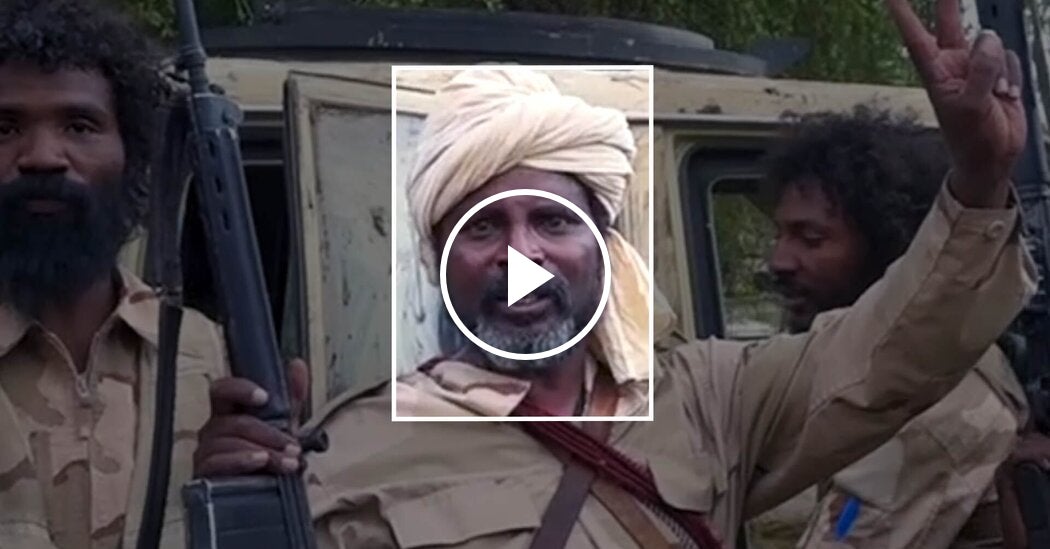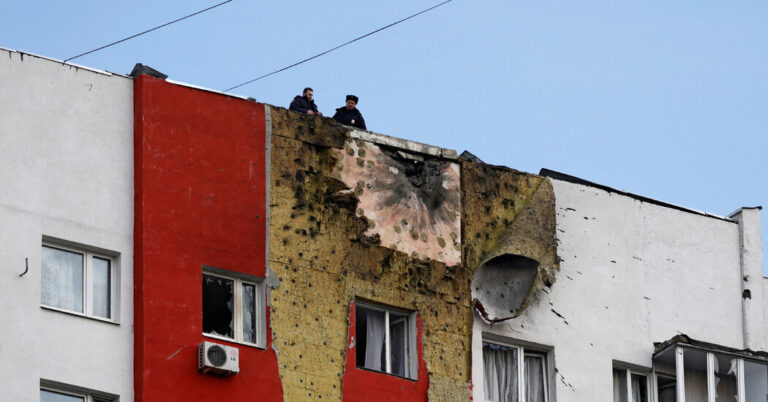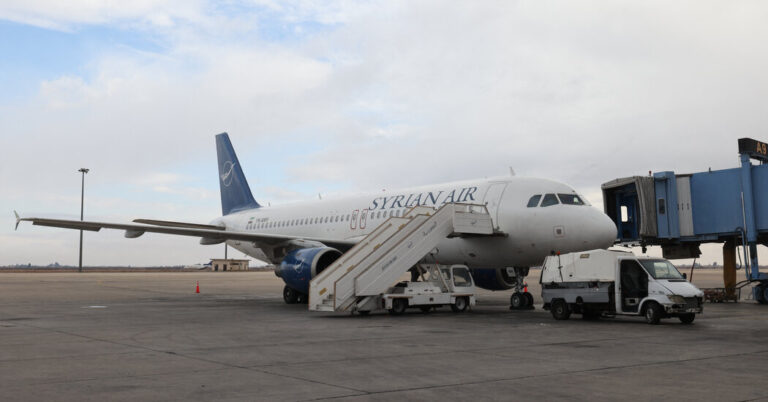Here is the plain text result:
The people are running away from the bombing. People are dying. We just send this to the nation to see what is happening in Nuba Mountains.
Sudan is in the grip of a brutal civil war. Eleven million people have been driven from their homes, and tens of thousands have been killed. As a paramilitary group called the Rapid Support Forces (R.S.F.) battles the Sudanese Army for control of the country.
The U.N. has accused both sides of abuses. But a six-month investigation by The New York Times shows that the R.S.F. is committing systemic atrocities across Sudan, including ethnic cleansing – often under the watch of its commanders.
R.S.F. fighters under these commanders often film atrocities themselves, evidence that may one day hold perpetrators to account.
We documented three broad patterns of abuse — executing unarmed captives, deliberately torching communities and directly abusing civilians, including with sexual violence.
R.S.F. fighters can be identified by their uniform. They wear light camouflage, often with a Sudanese flag on one sleeve and a distinctive logo on the other. They sometimes recruit mercenaries and fight alongside loose-knit militias, who are usually in plain clothes. And many have scarves known as kadamols wrapped around their heads.
We often hear them use the language of ethnic cleansing.
One of the commanders we found at the site of several atrocities is Hussein Barsham. He usually directs fighting in the Kordofan region, and that’s where we find him in October 2023, when the R.S.F. seized Baleela Airport and a major oil field nearby.
Barsham celebrates by the front of the terminal, but video filmed on the other side shows what their victory looks like — fighters executing a group of captives.
In addition to our analysis, a doctor with expertise in conflict-related injuries told us there are signs that that’s exactly what happened here.
Eight months later, we found Barsham with three more R.S.F. commanders, Salih Al Futi, Al Taj Al Tijani and a field commander with the nom de guerre John Garang, when their fighters carried out another execution.
For weeks, they oversaw a brutal campaign to capture the state’s capital, El Fasher, from Sudan’s army and forces allied with them.
The R.S.F. encircled the city in April. Dozens of outlying villages were torched in attacks targeting the Zaghawa ethnic group.
The senior commanders on the ground in El Fasher, Al Guba and Abu Shouk, were both in the Janjaweed and have led R.S.F. forces in North Darfur for years.
The presence of these high-ranking commanders in El Fasher — shows the significance of this campaign to the R.S.F., and it unwittingly links them to these atrocities.
Ekhlas, Arafa and many thousands more were forced to flee, this time back to Ekhlas’s home in Tawila. When Ekhlas reached her home, even that had been looted.
The terror that Ekhlas and Arafa endured in El Fasher is being inflicted on ordinary civilians throughout Sudan.
Countless videos show the R.S.F. whipping people. Beating them, sometimes shooting them. And forcing them to make animal noises.
In October, the R.S.F. repeatedly attacked civilians in Gezira State, after Abu Aqla Kaykal, an R.S.F. commander from that area — defected to Sudan’s army.
This triggered a wave of retaliation by the R.S.F. Across Kaykal’s home state. Villages in Gezira were also attacked when Kaykal was in the R.S.F. But this time, they specifically targeted the tribe he was from.
Hundreds were killed in a matter of weeks.
The R.S.F. reportedly kills more than 100 people in Al Seriha.
Simultaneous attacks were happening in villages right across the eastern Gezira region.
In many places, the R.S.F. round up the men of the area or force them to run away at gunpoint.
Witnesses we spoke to were terrified.
They stole Ammar El Awad Alam’s herd of goats. The R.S.F. emptied Al Seriha and many other villages. And the fighters gloated about their ethnic cleansing.
The attacks triggered another exodus. 150,000 people left in two weeks.
They are among over eight million people now displaced in Sudan, and millions more who have fled to neighboring countries.
Evidence we collected of the R.S.F. rampage in Gezira match multiple accounts of another type of abuse — sexual violence.
Survivors have given testimony to experts we interviewed, including Hala Al Karib, head of SIHA, a women’s advocacy group.
Her team also received testimonials of rape in several towns in Gezira, particularly around the area that Kaykal was from.
Tambul, Rufaa and Azraq are among the villages R.S.F. fighters bragged that they had destroyed.
Experts we spoke to said that separating men from their families, as we see in Gezira, is a key indicator of sexual violence.
Witnesses rarely talked directly about sexual violence, but they feared for the women and girls in their communities.
Hanan Abbakar Al Tahir recalled R.S.F. fighters leering at her in her home in Gezira. They also killed a man for defending women.
As Al-Nazeer fled his home, the R.S.F. beat him when he objected to women in his group being harassed. And later, he was shot.
Human Rights Watch, the U.N. and other groups have documented sexual violence in at least five states in Sudan since the conflict broke out.
Decades on from the genocide in Darfur, just one person has been put on trial at the International Criminal Court.
This time, there may be a stronger prospect for accountability.
The videos that fighters perceive as trophies of their exploits are regarded by the prosecutor of the I.C.C. as something else — evidence.
“So we can piece together the different types of evidence sets that are available now, from phones, from video and audio recordings, that are also proving to be extremely critical to pierce the veil of impunity.”
In this investigation, the footage allowed us to find 10 commanders overseeing potential crimes and identify the areas of operation of many more.
Their leader, General Dagalo, or Hemeti, may bear ultimate responsibility.
Over and over, fighters pay fealty to him. And the field commander we spoke to said that they take orders from the top.
In almost two years of war, Hemeti has failed to stop them from carrying out abuses.
But there are glimmers of hope.
The survivors we spoke to recalled the kindness of strangers, fellow citizens who offered food, shelter or protection as they fled.
What they need now is for the violence to end.
Source link




